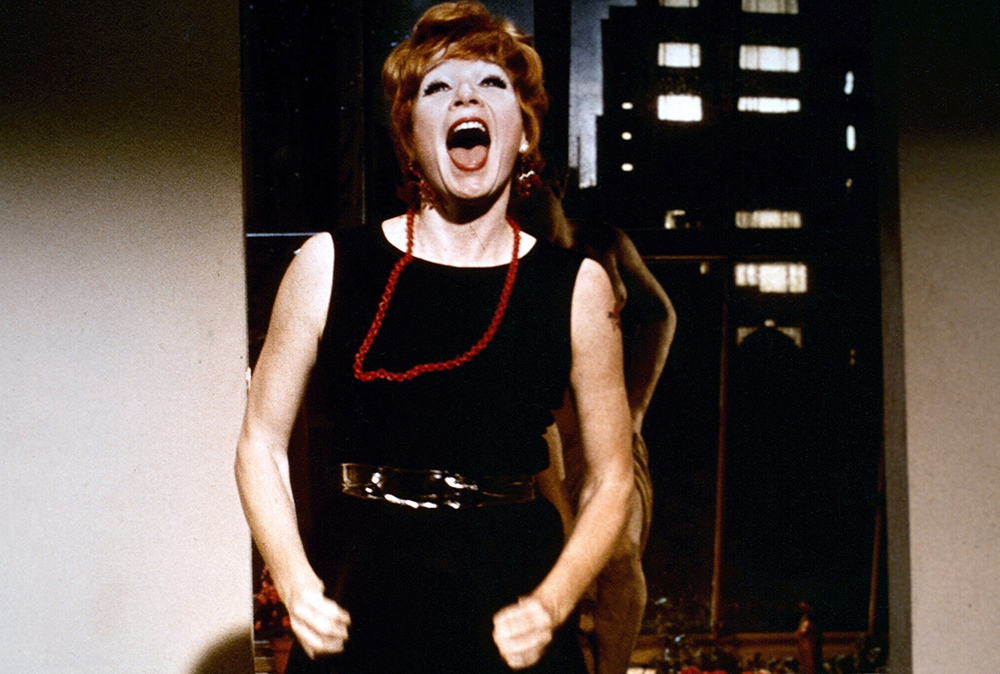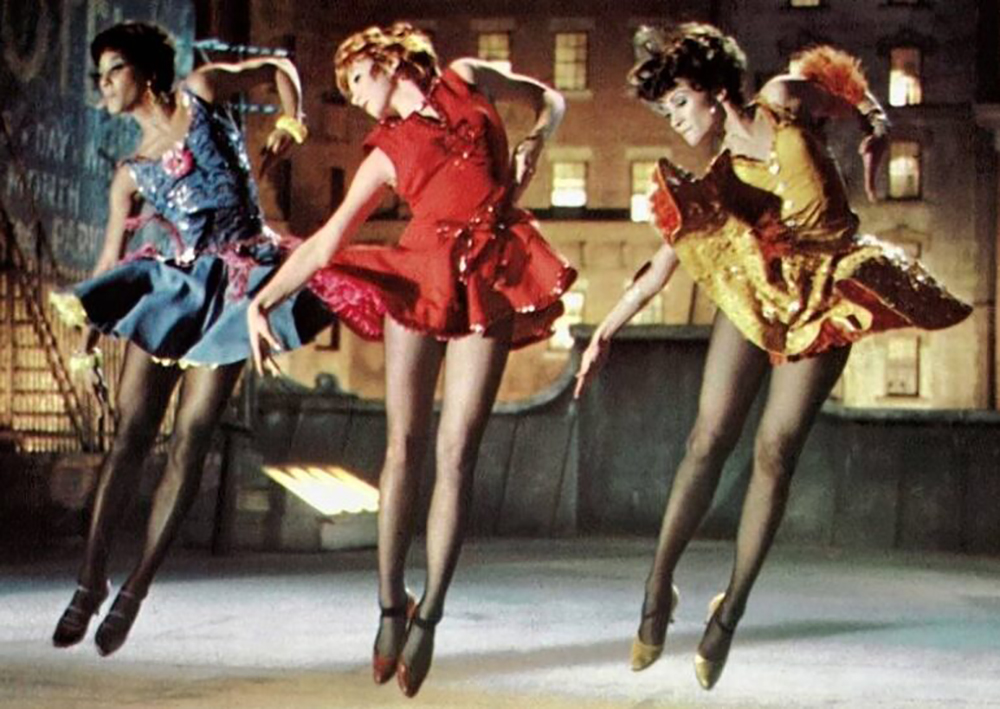In his first feature, Fosse borrowed not just from Fellini, but from himself bringing “Charity” to screen from a Broadway run, which Fosse directed and choreographed. A critical and commercial success (the film version was neither), the play premiered in 1966 and was nominated for nine Tony Awards, with Fosse winning the only one for ‘Best Choreography.’ Gwen Verdon, Fosse’s wife, played Charity in that version, earning a Tony nomination for her turn as the rough-luck dancehall hostess. On the strength of the stage production, Universal Pictures laid out an estimated $20 million, filming some of the most elaborate dance numbers on location in New York. The new restoration dazzles at its best moments, with Broadway pizzazz and bowlegged bravura. However, it falls short when it settles into repeated expository lulls, filling space with plot, instead of singular performers strutting the stage like Sally Bowles or Lenny Bruce.
Of ‘Sweet Charity’s’ Strengths and Weaknesses
The vibrant, garish production design screams excess in the best possible ways, evoking a Vincente Minnelli musical. No surprise then that the music and dancing are what ignite the most consistent spark. Only, there’s not enough of it. There’s the thumping, wheezy “Big Spender,” with its erotic horn and booming vocals, lighting up the smoky interior as the audience gazes at the girls, in the same position as their client. And when Charity celebrates her good fortune to be in the bedroom of the great actor Vittorio (Ricardo Montalbán), she sings “If My Friends Could See Me Now,” providing the most palpable sense of joy before an inevitable heartbreak. When the camera leaves the clubs and bedrooms, New York City (Charity’s “Personal Property”) proves to be a most generous collaborator, allowing Charity and her marching band to peacock all the way from Lincoln Center uptown to Wall Street downtown.
But if the excesses of the dancing scenes are a strength, the abundance of conventional romantic tropes and predictable Neil Simon (he wrote the script) jokes are neutralizing weaknesses. After being used and disposed of by Vittorio, lovelorn Charity meet-cutes with the neurotic claustrophobe Oscar (John McMartin) in a malfunctioning elevator, an opposites-attract situation that seems, at first, a perfect fit for each side. Charity’s got her guard up (she claims that she works at a bank in Brooklyn) while Oscar overshares (he’s late for group therapy). The two defy reason and fall in love, with Oscar proposing marriage and a move to New Jersey, with a garden and a home. Charity’s unflappable friends and colleagues Nickie (Chita Rivera) and Helene (Paula Kelly) have heard it all before, and don’t buy into Charity’s optimism or her idea of Mr. Right’s charmed life. He did say New Jersey, after all.
The New Restoration Includes an Alternate Ending
Oscar’s panic surfaces at a farewell party, when Charity’s fellow showgirls and their clients celebrate the happy couple. The camera freezes on him when Charity’s boss slaps her butt, and the nail in the marital coffin is that familiar conversation the insecure male has with the “experienced” woman: you’ve slept with how many men! This conjures Barbara Stanwyck and Henry Fonda in “Lady Eve” (1940). However, this scene isn’t played for laughs, and Charity knows she’s not negotiating from a position of power like Stanwyck’s cagey card shark. There’s no haggling with Oscar here, and he has nothing to lose bailing on Charity, who quit her job and left her home. She pleads with Oscar, promising to remove the heart tattoo, no matter how much it hurts. But at that point, it’s too late: Oscar ditches Charity at the altar, refusing to sign the papers to cement their union.

For a story which presents so many of Charity’s failures and so little genuine joy, it’s fair to question Fosse’s (and Simon’s) intention here. Is Charity a born loser, unworthy of love? A pushover who gets what she has coming to her? Perhaps she’s just unlucky, having run out of options and not having many in the first place. The new restoration includes an alternate ending, with both versions explaining that Charity lived hopefully ever after. In the alternate version, presumably intended to placate studio executives and audiences accustomed to pat finales, Charity and Oscar end up together, an especially unbelievable outcome given the arc of future Fosse narratives with stubborn, ambitious show gals (“Cabaret”, “Star 80”) and guys (“All That Jazz,” “Lenny”) who resist conformity yet sacrifice independence, with mixed results.
Shirley MacLaine’s Charity Deserved Better
In “Cabaret” (1972), Sally (Liza Minnelli), abandoned by unreliable lovers and stood up by her father, bets on herself, allowing Brian (Michael York) to take the next train home so she can go back to the nightclub. And in “All That Jazz” (1980), despite the punishment Fosse surrogate Joe Gideon (Roy Scheider) inflicts on both his body (drinking, drugs, sex) and those who love him, he’s able to defy death — for a time — in the name of his art. In those stories, Fosse’s worldview — as a cynical romantic, a co-dependent individualist — leaps from page to screen with an uncompromising originality and commanding artistic sensibility that “Sweet Charity” lacks.
Charity is less a composite of Fosse protagonists than a rough sketch, a tragic figure whose primary folly is that she trusts the world despite it giving her no reason to. She errs in the same way Sally does, but at least Sally can retreat to performance. Without a backup plan, Charity falls into the category of Honey Bruce (Valerie Perrine), Lenny’s faithful wife, or, most extreme, the ingenue playmate Dorothy (Mariel Hemingway) who’s murdered by her husband in “Star 80” (1980). Similar to those two, it’s unconditional loyalty which clouds Charity’s judgment, so in the end, she’s all she’s got. MacLaine played Charity with grit, charisma and humor, but she deserves better than some clever quips and a cloying promise before the closing credits. Maybe a third ending would do the trick.
“Sweet Charity” will be playing at New York City’s Film Forum until March 30th. Follow us for more Film Forum exclusives for those in the Manhattan area.



